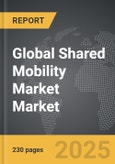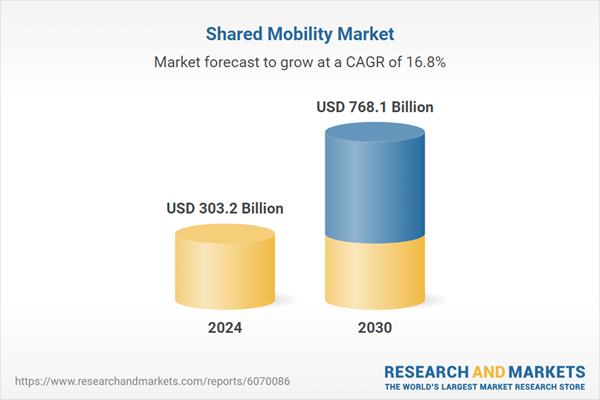Global Shared Mobility Market - Key Trends & Drivers Summarized
Is the Shift from Ownership to Access Reshaping Urban Transportation?
The global shared mobility market is undergoing a transformative shift, driven by changing attitudes toward vehicle ownership, urban congestion, environmental concerns, and technological innovation. Consumers - particularly younger, urban populations - are increasingly opting for convenient, flexible transportation alternatives such as ride-hailing, car-sharing, bike-sharing, and scooter-sharing services instead of purchasing private vehicles. This shift is being fueled by the rising cost of vehicle ownership, limited parking availability, and growing awareness of the environmental impact of fossil-fueled transportation. Shared mobility platforms offer on-demand, app-based access to vehicles, enabling users to meet short-term travel needs with greater efficiency. This model supports multimodal urban mobility by allowing seamless integration with public transit and last-mile solutions. Governments and city planners are increasingly supporting shared mobility through dedicated infrastructure, congestion pricing, and emission-reduction incentives, recognizing its potential to reduce traffic, lower emissions, and optimize transportation networks. The trend reflects a broader evolution toward mobility-as-a-service (MaaS), where users access transportation as a utility rather than a possession - redefining how cities move, commute, and interact with transport systems.Can Technology and Platform Integration Accelerate Market Maturity?
The rapid advancement of digital technologies is a cornerstone of growth in the shared mobility market, enabling real-time vehicle tracking, seamless booking, digital payments, dynamic pricing, and user analytics. Cloud computing, GPS, mobile apps, and AI-driven algorithms are allowing service providers to match supply with demand more efficiently, reduce idle time, and personalize user experiences. Shared mobility platforms are increasingly integrating across services - such as combining car-sharing with bike-sharing and public transit options - to create all-in-one mobility apps. These multimodal platforms are essential in building scalable, interoperable transportation networks that can adapt to evolving consumer behaviors and urban constraints. Additionally, the use of big data analytics helps operators identify travel patterns, optimize fleet distribution, and improve maintenance and operational decisions. The rise of autonomous vehicles and connected car technology also points toward a future where shared mobility fleets will operate with minimal human intervention, drastically reducing costs and expanding service areas. As competition intensifies, successful platforms will be those that can offer a seamless, safe, and frictionless user journey supported by robust backend systems and strategic partnerships across sectors.Is Sustainability and Policy Support Driving Long-Term Viability?
Environmental sustainability is a core driver behind the expansion of shared mobility, as global efforts to curb emissions, improve air quality, and promote cleaner cities gain momentum. Shared electric vehicles - ranging from e-bikes and e-scooters to EV-based ride-hailing fleets - are rapidly replacing internal combustion engine vehicles in urban settings. Many cities are offering incentives, subsidies, or regulatory support to accelerate the electrification of shared mobility fleets and reduce the carbon footprint of transportation. In addition, shared mobility aligns with public policy goals aimed at reducing vehicle miles traveled, alleviating traffic congestion, and maximizing land use. Governments in Europe, North America, and parts of Asia are actively integrating shared mobility into urban transport planning through dedicated lanes, mobility hubs, and data-sharing mandates. Public-private partnerships are also on the rise, enabling collaborative innovation and efficient service rollout. At the same time, operators are embracing ESG commitments by adopting sustainable operations, recycling initiatives, and energy-efficient charging systems. These developments are not only improving the social license of shared mobility providers but are also making the business model more resilient to future regulatory shifts and urban mobility trends.What's Driving the Growth in the Shared Mobility Market?
The growth in the shared mobility market is driven by several factors directly linked to evolving consumer expectations, urbanization trends, and technological innovation. First, the increasing demand for affordable and flexible transportation options is pushing consumers - especially in metropolitan areas - to shift from private vehicles to shared services. Second, the proliferation of smartphones, mobile payment platforms, and location-based services is enabling seamless access to shared mobility networks. Third, rising environmental consciousness and urban air quality concerns are driving demand for electric and low-emission shared mobility options. Fourth, growing investment in transportation technology startups is fueling innovation in vehicle connectivity, fleet management, and user engagement tools. Fifth, the integration of shared mobility platforms with public transit systems is enhancing last-mile connectivity and reducing reliance on single-occupancy vehicles. Sixth, favorable government regulations, funding programs, and infrastructure investments are creating an enabling environment for shared services to thrive. Seventh, demographic shifts - including the preferences of younger generations for experience over ownership - are reshaping long-term demand patterns. Lastly, the COVID-19 pandemic has accelerated changes in mobility behavior, with a renewed focus on hygiene, flexibility, and digital-first solutions, leading to the redesign and relaunch of shared mobility offerings in more agile, user-centric formats. Collectively, these factors are propelling shared mobility from an alternative mode of transport into a mainstream pillar of the global urban mobility ecosystem.Report Scope
The report analyzes the Shared Mobility market, presented in terms of market value (US$). The analysis covers the key segments and geographic regions outlined below:- Segments: Service Model (Ride-Hailing, Bike Sharing, Ride Sharing, Car Sharing, Others); Channel (Online, Offline); Vehicle (Car, Two-Wheelers, Others).
- Geographic Regions/Countries: World; United States; Canada; Japan; China; Europe (France; Germany; Italy; United Kingdom; and Rest of Europe); Asia-Pacific; Rest of World.
Key Insights:
- Market Growth: Understand the significant growth trajectory of the Ride-Hailing segment, which is expected to reach US$308.8 Billion by 2030 with a CAGR of a 18.6%. The Bike Sharing segment is also set to grow at 16.3% CAGR over the analysis period.
- Regional Analysis: Gain insights into the U.S. market, valued at $79.7 Billion in 2024, and China, forecasted to grow at an impressive 15.7% CAGR to reach $118 Billion by 2030. Discover growth trends in other key regions, including Japan, Canada, Germany, and the Asia-Pacific.
Why You Should Buy This Report:
- Detailed Market Analysis: Access a thorough analysis of the Global Shared Mobility Market, covering all major geographic regions and market segments.
- Competitive Insights: Get an overview of the competitive landscape, including the market presence of major players across different geographies.
- Future Trends and Drivers: Understand the key trends and drivers shaping the future of the Global Shared Mobility Market.
- Actionable Insights: Benefit from actionable insights that can help you identify new revenue opportunities and make strategic business decisions.
Key Questions Answered:
- How is the Global Shared Mobility Market expected to evolve by 2030?
- What are the main drivers and restraints affecting the market?
- Which market segments will grow the most over the forecast period?
- How will market shares for different regions and segments change by 2030?
- Who are the leading players in the market, and what are their prospects?
Report Features:
- Comprehensive Market Data: Independent analysis of annual sales and market forecasts in US$ Million from 2024 to 2030.
- In-Depth Regional Analysis: Detailed insights into key markets, including the U.S., China, Japan, Canada, Europe, Asia-Pacific, Latin America, Middle East, and Africa.
- Company Profiles: Coverage of players such as Asahi Kasei Corporation, Composite Technology Development, Inc., Cornerstone Research Group (CRG), Covestro AG, DuPont de Nemours, Inc. and more.
- Complimentary Updates: Receive free report updates for one year to keep you informed of the latest market developments.
Some of the 44 companies featured in this Shared Mobility market report include:
- Bird Rides Inc.
- BlaBlaCar
- Blu-Smart Mobility Pvt. Ltd.
- Bolt Technology
- Cabify
- Car2Go (Share Now)
- Careem (Uber subsidiary)
- Didi Chuxing Technology Co.
- EasyMile SAS
- Free2Move (Groupe PSA)
- Getaround
- Gojek
- Grab Holdings Inc.
- inDrive
- Lime
- Lyft Inc.
- Lyft Inc.
- MaaS Global
- Meru Mobility Tech Pvt. Ltd.
- Movmi Shared Transportation Services
- Ola Cabs (ANI Technologies Pvt. Ltd.)
- Scoot Networks
- Share Now (BMW and Daimler)
- Spin (Ford Mobility)
- Turo
- Uber Technologies Inc.
- Via Transportation Inc.
- Yandex.Taxi
- Zipcar (Avis Budget Group)
- Zoomcar India Private Limited
This edition integrates the latest global trade and economic shifts into comprehensive market analysis. Key updates include:
- Tariff and Trade Impact: Insights into global tariff negotiations across 180+ countries, with analysis of supply chain turbulence, sourcing disruptions, and geographic realignment. Special focus on 2025 as a pivotal year for trade tensions, including updated perspectives on the Trump-era tariffs.
- Adjusted Forecasts and Analytics: Revised global and regional market forecasts through 2030, incorporating tariff effects, economic uncertainty, and structural changes in globalization. Includes historical analysis from 2015 to 2023.
- Strategic Market Dynamics: Evaluation of revised market prospects, regional outlooks, and key economic indicators such as population and urbanization trends.
- Innovation & Technology Trends: Latest developments in product and process innovation, emerging technologies, and key industry drivers shaping the competitive landscape.
- Competitive Intelligence: Updated global market share estimates for 2025, competitive positioning of major players (Strong/Active/Niche/Trivial), and refined focus on leading global brands and core players.
- Expert Insight & Commentary: Strategic analysis from economists, trade experts, and domain specialists to contextualize market shifts and identify emerging opportunities.
Table of Contents
Companies Mentioned (Partial List)
A selection of companies mentioned in this report includes, but is not limited to:
- Bird Rides Inc.
- BlaBlaCar
- Blu-Smart Mobility Pvt. Ltd.
- Bolt Technology
- Cabify
- Car2Go (Share Now)
- Careem (Uber subsidiary)
- Didi Chuxing Technology Co.
- EasyMile SAS
- Free2Move (Groupe PSA)
- Getaround
- Gojek
- Grab Holdings Inc.
- inDrive
- Lime
- Lyft Inc.
- Lyft Inc.
- MaaS Global
- Meru Mobility Tech Pvt. Ltd.
- Movmi Shared Transportation Services
- Ola Cabs (ANI Technologies Pvt. Ltd.)
- Scoot Networks
- Share Now (BMW and Daimler)
- Spin (Ford Mobility)
- Turo
- Uber Technologies Inc.
- Via Transportation Inc.
- Yandex.Taxi
- Zipcar (Avis Budget Group)
- Zoomcar India Private Limited
Table Information
| Report Attribute | Details |
|---|---|
| No. of Pages | 230 |
| Published | January 2026 |
| Forecast Period | 2024 - 2030 |
| Estimated Market Value ( USD | $ 303.2 Billion |
| Forecasted Market Value ( USD | $ 768.1 Billion |
| Compound Annual Growth Rate | 16.8% |
| Regions Covered | Global |









